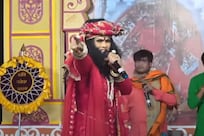On her first evening performing as a stand-up comedian two years ago, Sheida Ibrahim didn’t hesitate to poke fun at herself. The Emirati cracked jokes about her name and physical appearance as a teenager.
“That was my first act, but looking back I’m wondering how could anyone have found that funny?” says the 30-year-old HR professional, with a laugh.
Putting herself and her culture at the centre of comedy took a lot of guts and Ibrahim only managed to muster the courage after a freak accident during a holiday in 2011.
“I fell from a three-storey building and broke all my bones,” says Ibrahim. “My survival is what they call a miracle and that changed my whole life. I couldn’t walk for three months and every minute seemed forever. I even had to quit my job.
“After that I knew it couldn’t get any worse and that life can only get better from here. During the break from work, I took a comedy workshop to get over my fear of public speaking and haven’t looked back since.
“I have a very serious job and comedy allows me to come out of that zone, laugh at myself and take it easy. A sort of therapy and confidence booster.”
The past few years have seen more Emirati men take the stage to display their funny side, but that trend has not extended to Emirati women, yet. Ibrahim has a theory about it.
“It boils down to ours being a conservative culture,” she says. “Women here haven’t seen female Emirati stand-up comedians, so there is a fear of the unknown.
“Emirati women may also worry about what others might think if they go up on stage and make a fool of themselves. It is all about shedding inhibitions.”
Ibrahim says one of the other reasons Emirati women shy away from the spotlight might be their clothing, but adds that it shouldn’t be seen as a restriction.
“People here respect what you wear and you can wear whatever you want and still be funny,” she says.
Although culture often provides the richest material for stand-up, it can be a dicey topic for many.
“You don’t necessarily have to talk about culture,” she says. “Anything can be spun into jokes – it could be about what happened on the roads or shopping. A lot of women talk about kids and that turns into amazing comedy. The sky is the limit.”
Taking a short course in stand-up comedy led Ibrahim and her three friends from the class to set up Comedy Dubai in 2012. The troupe has invited several international artists to perform alongside local talent at a number of venues and corporate gigs.
“We had all caught the comedy bug and Comedy Dubai was a natural progression,” says Ibrahim.
“At first, getting restaurants and clubs to buy in to the idea of amateur comedians performing wasn’t easy, but we did free shows and pushed it through social media. We began roping in international comedians so that people would get a variety.”
Although Comedy Dubai disbanded this year because all the members were leaving the country temporarily, Ibrahim says there is a growing appetite for close-to-home humour in the city.
“People want to hear about the real Dubai, about its diversity, the different cultures – and our troupe brought that,” she says.
Ibrahim, who will soon be heading to the United Kingdom to complete a year-long masters programme in human resources, says day-to-day incidents, traditions, local fads and work are the source of her material.
“I turn everything that frustrates me into something funny,” she says with a grin. “Comical clients, family pressure to get married, some family values – they are all usable. At the same time, I am also educating the audience about my culture and busting some misconceptions in the process.”
One of her most popular routines has been about the gamboo’a, a UAE hairstyle also called the “camel hump”.
“I thought it would be frowned upon, but the audience quite enjoyed it,” she says.
Ibrahim has also tested her locally influenced one-liners in a show in the UK, without much success.
"I managed to get a slot in the King Gong show at the Comedy Store in London," she says. "I did a set about how Emiratis go to London and buy football clubs. It didn't go down very well and true to the format of the show, I was given three red cards and booed offstage.
“I had lost my confidence and it took me three months to get back on stage after that, but this time I revised my jokes and perfected my act.”
Minor setbacks clearly won’t deter Ibrahim from realising her dream of setting up a comedy club in the UAE when she returns from the UK.
“I’m going to broaden my subjects and rewrite material that will appeal to a more international audience,” she says. “And when I return to the UAE, I want to open the first comedy club in the country and run comedy events on a regular basis.”
aahmed@thenational.ae
• Trendsetters is Arts&Life’s eight-part summer series profiling UAE innovators excelling in their fields





